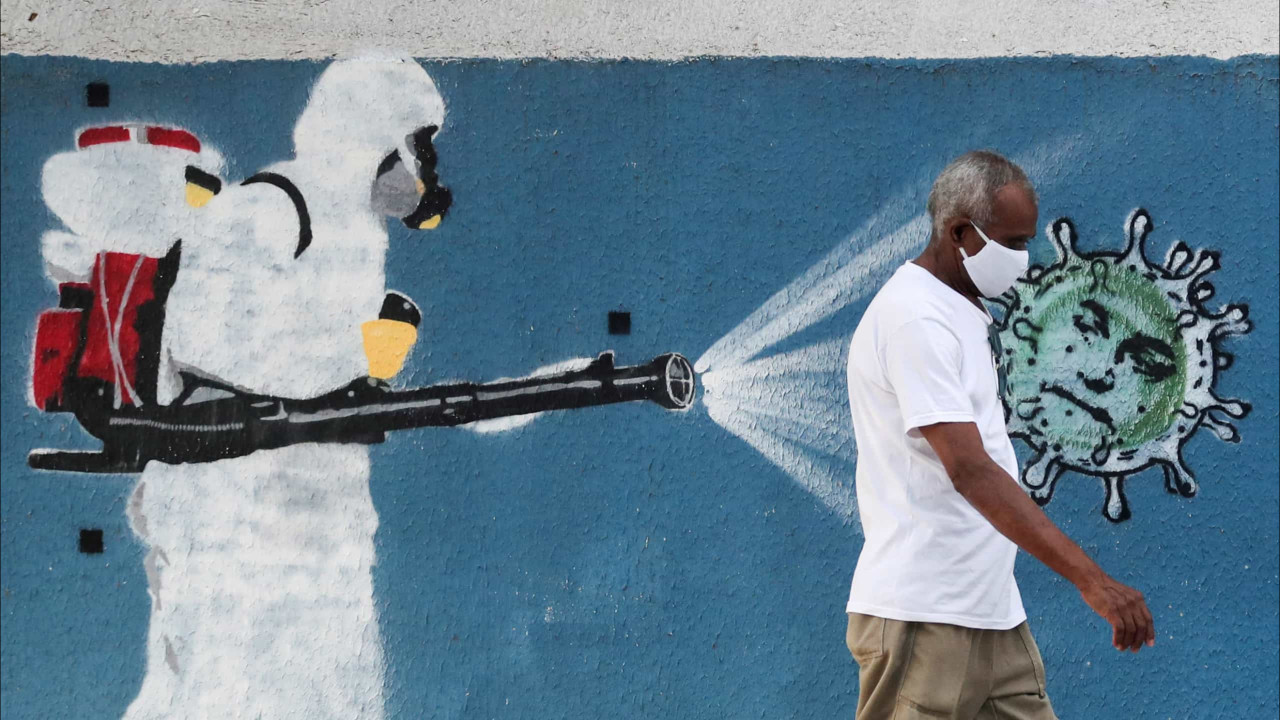
AThis Wednesday marks four years since the World Health Organization (WHO) declared Covid-19 a pandemic.
What the world was used to seeing in fiction films became reality all over the world: people closed their doors, millions were laid off and going out into the streets became the exception.
A lot has happened in four years – Europe once again had a war, and in the Middle East the conflicts in Palestinian territory worsened, forcing the withdrawal of the population from Gaza. Teleworking was ‘installed’ in many places, and, among other changes in people’s lives, there were controversies and situations resulting from this pandemic – both nationally and globally – in all areas.
But first, let’s remember…
December 31, 2019
The WHO office in China is notified of a mysterious pneumonia-like illness.
January 7, 2020
Public health authorities identify a new type of coronavirus as being at the root of the outbreak.
March 2
The then Minister of Health, Marta Temido, announced the first two cases in Portugal. The two patients were hospitalized in Porto.
March 16th
After several measures, such as the reinforcement of professionals in the National Health Service, the closure of some spaces, the reduction of agendas and commitments and also alerts with some precautions, the first death following complications created by Covid-19 is recorded .
March 11, 2020
The WHO classifies Covid-19 as a pandemic.
March 18th
The President of the Republic, Marcelo Rebelo de Sousa, decrees a state of emergency for 15 days, which included mandatory confinement and restrictions on public roads.
April 2, 2020
Covid-19 diagnoses exceed one million people worldwide.
April 30, 2020
The Government approves a transition plan from the state of emergency to a calamity situation and announces that from May 4th some services will open, but maintain teleworking
November 18, 2020
A 48-year-old woman was the first known case of reinfection of the disease in Portugal. At the time, only five cases of reinfection had been proven worldwide.
Between advances and setbacks and increases in cases, the investigation developed and, on December 27, 2020, the national vaccination plan against Covid-19 began at Hospital de São João, in Porto.
Between financial lines to help people who were left without a job, or found themselves on layoff, and the return to normality took many months. After three years, on May 5 last year, the director-general of the WHO, Tedros Adhanom Ghebreyesus, announced the end of the pandemic, even though he warned that the disease was “here to stay”.
But between the existence of a pandemic and the return to normality, what did Covid-19 ‘bring’?
It was this same WHO official who, a month after announcing the end of the pandemic, praised Portugal in the fight against the disease. “I would be remiss if I did not recognize the tremendous work of Portugal as a nation, in its response to the Covid-19 pandemic. The country responded quickly and had one of the highest vaccination rates in the world”he said, after receiving his doctorate ‘honoris causa’ from the Faculty of Medicine of the University of Coimbra (FMUC).
“In a language closer to the times and, above all, to today’s young people, if the WHO was the planetary guardian and the Star of Life, Tedros Adhanom Ghebreyesus was our superhero”, pointed out Filipe Froes, professor at FMUC. “Few WHO directors-general have experienced a pandemic like the one we experienced. It lasted 1,151 days in the 21st century and documented not only the indispensability of the WHO, but the spirit of dedication and mission of its director-general and the example of a whole life dedicated to the service of humanity”, he stated.
This Covid-19 pandemic has also opened our eyes to another: domestic violence. In June 2020, the president of the Portuguese Victim Support Association, João Lázaro, gave an interview to News by the Minutewhere he stated that the “sad pre-pandemic trajectory” was already returning.
A study carried out the previous year by the National School of Public Health reported data on this crime at the time of the pandemic.
And outside?
If the pandemic affected – on a large scale – the work of many people and resulted in many difficulties, there were those who did not want to ‘leave’ work in times of isolation.
In the United Kingdom, this ‘will’ even resulted in a scandal that became known as Partygate, which concerns a gathering of members of the Conservative Party in 2020, at a time when there were restrictions on gatherings given the public health situation.
Several photographs and videos emerged and the controversy spread, leaving a trail that, to this day, ‘forces’ the current British Prime Minister, Rishi Sunak, to apologize for the measures and situation at that time.
Covid-19 also ‘stirred’ the waters, with renowned figures refusing to be vaccinated and, given the global public health crisis, creating some consequences. This is the case of Novak Djokovic, who found himself prevented from participating in several tournaments in 2023. In March last year, the tennis player had already lost 12.44 million euros in prizes.
The biggest ‘slice’ resulted from the absence of the US Open, which could have earned him a financial contribution of 2.4 million euros. This was followed by the double ‘farewell’ to the Australian Open, in 2022 and 2023, whose bonuses were set at 1.8 and 1.9 million euros, respectively.
Read Also: Pedro Nuno accuses Ferreira Leite of “disrespect for the victims” of Covid

Download our free App.
Eighth consecutive year Consumer Choice for Online Press and elected product of the year 2024.
* Study by e Netsonda, Nov. and ten. 2023 product of the year – pt.com
Source: https://www.noticiasaominuto.com/mundo/2519264/pandemia-de-covid-19-declarada-ha-4-anos-como-tudo-comecou-e-polemicas




